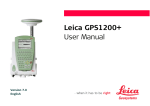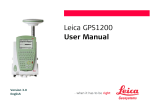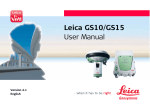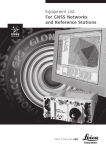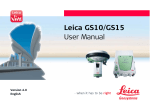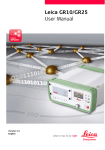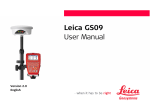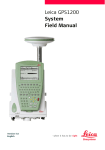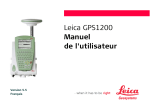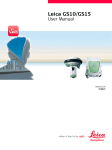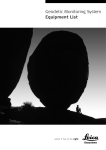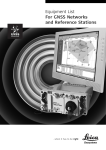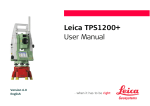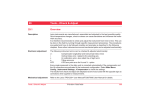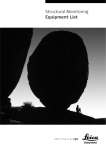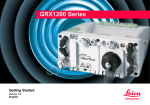Download Leica GPS1200 User Manual
Transcript
Leica GPS1200 User Manual Version 5.5 English GPS1200 Introduction 2 Introduction Purchase Congratulations on the purchase of a GPS1200 series instrument. This manual contains important safety directions as well as instructions for setting up the product and operating it. Refer to "6 Safety Directions" for further information. Read carefully through the User Manual before you switch on the product. Product identification The type and the serial number of your product are indicated on the type plate. Enter the type and serial number in your manual and always refer to this information when you need to contact your agency or Leica Geosystems authorized service workshop. Type: _______________ Serial No.: _______________ Symbols The symbols used in this manual have the following meanings: Type Description Danger Indicates an imminently hazardous situation which, if not avoided, will result in death or serious injury. Warning Indicates a potentially hazardous situation or an unintended use which, if not avoided, could result in death or serious injury. Caution Indicates a potentially hazardous situation or an unintended use which, if not avoided, may result in minor or moderate injury and/or appreciable material, financial and environmental damage. ) Trademarks Important paragraphs which must be adhered to in practice as they enable the product to be used in a technically correct and efficient manner. • Windows and Windows CE are a registered trademark of Microsoft Corporation • CompactFlash and CF are trademarks of SanDisk Corporation • Bluetooth is a registered trademark of Bluetooth SIG, Inc All other trademarks are the property of their respective owners. Introduction GPS1200 3 GPS1200 Introduction Validity of this manual Illustrations Available documentation 4 • This manual applies to all GPS1200 instruments. Differences between the various models are marked and described. • The RX1200 is available as RX1210 or with touch screen functionality as RX1210T, RX1250X, RX1250Xc, RX1250T or RX1250Tc. The name RX1210 is used throughout the manual and may also represent the touch screen models. Only use the supplied stylus on the screens of the touch screen models. For the purpose of the illustrations, a GX1230 model has been selected which is representative for all models. Name Description User Manual All instructions required in order to operate the product to a basic level are contained in the User Manual. Provides an overview of the product together with technical data and safety directions. Format x x Name Description Format System Field Manual Describes the general working of the product in standard use. Intended as a quick reference field guide. - x Applications Field Manual Describes specific onboard application programs in standard use. Intended as a quick reference field guide. The RoadRunner application program is described in a separate manual. x x Technical Reference Manual Overall comprehensive guide to the product and program functions. Included are detailed descriptions of special software/hardware settings and software/hardware functions intended for technical specialists. - x Refer to the following resources for all GPS1200 documentation and software: • the SmartWorx DVD • Introduction http://www.leica-geosystems.com/downloads GPS1200 5 GPS1200 Table of Contents 6 Table of Contents In this manual Chapter 1 Page Description of the System 10 1.1 1.2 2 System Components System Concept 1.2.1 Software Concept 1.2.2 Data Storage and Data Conversion Concept 1.2.3 Power Concept 1.3 Container Contents 1.4 Receiver Components User Interface 10 15 15 17 19 21 23 24 3 2.1 Operating Principles 2.2 Icons Operation 24 30 34 3.1 3.2 3.3 3.4 3.5 34 36 39 43 53 Equipment Setup Battery Working with the CompactFlash Card Working with the Clip-On-Housings for Devices Accessing Survey Application Program 4 3.6 Guidelines for Correct Results 3.7 Operation with a Typical Configuration Set Reference Station 56 57 62 5 4.1 Overview 4.2 Equipment Setup 4.3 Getting Started with the GRX1200 Series Care and Transport 62 66 71 80 6 5.1 Transport 5.2 Storage 5.3 Cleaning and Drying Safety Directions 80 81 82 84 6.1 6.2 6.3 6.4 6.5 6.6 6.7 6.8 Table of Contents General Introduction Intended Use Limits of Use Responsibilities International Warranty, Software Licence Agreement Hazards of Use Electromagnetic Compatibility EMC FCC Statement, Applicable in U.S. GPS1200 84 85 87 88 89 91 101 104 7 GPS1200 Table of Contents 7 8 Technical Data 110 7.1 110 110 115 117 123 129 133 133 135 137 139 7.2 7.3 7.4 Index Receiver Technical Data 7.1.1 Tracking Characteristics of the Receiver 7.1.2 Accuracy 7.1.3 Technical Data Antennas Technical Data RX1200 Technical Data Conformity to National Regulations 7.4.1 RX1250 7.4.2 Receiver 7.4.3 GFU24, Siemens MC75 7.4.4 GFU19 (US), GFU25 (CAN) CDMA MultiTech MTMMC-C 142 Table of Contents GPS1200 9 Description of the System 1 1.1 GPS1200 10 Description of the System System Components Main components Component Description Receiver To calculate a range to all visible satellites. RX1200 To operate the user interface either by the keyboard or by the touch screen with supplied stylus. Antenna To receive the satellite signals from the GNSS (Global Navigation Satellite System) satellites. LEICA Geo Office The office software including a series of help programs which support working with GPS1200. LEICA GPS Spider The reference station software required to operate the reference station receivers of GPS1200. Receivers Receiver Description GX1230 GG 14 L1, 14 L2 channels (GPS), twelve L1, twelve L2 channels (GLONASS), two channels SBAS, code and phase, real-time capable GX1230 14 L1, 14 L2 channels, two channels SBAS, code and phase, real-time capable GX1220 GG 14 L1, 14 L2 channels (GPS), twelve L1, twelve L2 channels (GLONASS), two channels SBAS, code and phase GX1220 14 L1, 14 L2 channels, two channels SBAS, code and phase GX1210 14 L1 channels, two channels SBAS, code and phase GX1200 with PPS/Event option 14 L1, 14 L2 channels, code and phase, real-time capable, with event and PPS ports GRX1200 Classic 14 L1, 14 L2 channels, code and phase, real-time capable, for reference station applications GRX1200 Lite 14 L1, 14 L2 channels, code and phase, real-time capable, for reference station applications, no ring buffer logging, no download of internally logged data and upload of files to receiver by remote control Description of the System GPS1200 11 GPS1200 Description of the System ) Antennas used with receivers 12 Receiver Description GRX1200 Pro 14 L1, 14 L2 channels, code and phase, real-time capable, with event, PPS, oscillator and NET port, for reference station applications GRX1200 GG Pro 14 L1, 14 L2 channels (GPS), twelve L1, twelve L2 channels (GLONASS), code and phase, real-time capable, with event, PPS, oscillator and NET port, for reference station applications The GX1230 GG, GX1230, GX1220 GG, GX1220, GX1200 with PPS/Event option and GRX1200 Series receivers use the GPS P-code signal, which by U.S. policy is liable to be switched off without notice. Phase measurements on L2 are ensured as these receivers automatically switch to patented tracking techniques. Receiver Antenna GX1230 GG/GX1230/ GX1220 GG/GX1220 Typically: AX1202 GG, otherwise: AT504 GG/AT504 GX1210 AX1201 GRX1200 Series Typically: AT504 GG/AT504, otherwise: AX1202 GG LEICA Geo Office • LGO supports the GPS1200 and TPS1200 instruments. It also supports all other Leica TPS instruments. • LGO is based on a graphical user interface with standard Windows® operating procedures. • LGO provides the following functionality: Functionality Description Standard Functionality Includes data exchange between computer and receiver, data management including viewing and editing, reporting, creation and management of codelists, creation and use of format files for data conversion, uploading and deleting of system software and application programs. Extended Func- Includes coordinate transformations, GPS and GLONASS post tionality processing, level data processing, network adjustment, GIS and CAD Export. • Supported operating systems: Windows® XP, Windows® 2000. Refer to the online help of LGO for additional information. Description of the System GPS1200 13 Description of the System LEICA GPS Spider GPS1200 14 The reference station software is known as LEICA GPS Spider. It is required to operate the GRX1200 Series receivers. Use • • • to connect from a PC to a GPS1200 • receiver locally or remotely. to configure receiver operation. • to monitor receiver operation. • • to automatically download raw data. to automatically convert data to RINEX format. to automatically archive data files. to automatically distribute to FTP locations. Operating systems • Windows® XP • Windows® 2000 Refer to the online help of LEICA GPS Spider for additional information. 1.2 System Concept 1.2.1 Software Concept Description Software type All receivers use the same software concept. Software type Description System software This important software covers the basic functions of the instrument. System software is also referred to as firmware. The programs Survey and Setup are integrated into the firmware and cannot be deleted. The English language is integrated into the firmware and cannot be deleted. Language software Numerous languages are available for the receivers. Language software is also referred to as system language. The system software enables a maximum of three languages which can be stored at any one time - the English language and two other languages. The English language is the default language and cannot be deleted. One language is chosen as the active language. Description of the System GPS1200 15 Description of the System GPS1200 Software type Description Application programs A suite of optional survey-specific application programs are available for the instrument. 16 Some of these programs are freely available and can be loaded and are immediately activated. The other programs must be purchased and are only activated with a licence key. Software upload Customised application programs Custom software specific to user requirements can be developed using the GeoC++ development kit. Information on the GeoC++ development environment is available on request from a Leica Geosystems representative. RX1200 software For RX1210 and RX1210T. This software covers display, sound and communication settings of the RX1210 and RX1210T. All instrument software is stored in the System RAM of the receiver. The software can be uploaded onto the receiver using the following methods: • Using LGO the software is transferred via the serial interface to the CompactFlash card in the receiver, which is then stored to the System RAM. • By connecting the CompactFlash card directly to the computer either via an internal card slot housing or an external OMNI drive, the software is transferred to the card, which is then stored to the System RAM. 1.2.2 Data Storage and Data Conversion Concept Description Data is stored within a job in a database on a memory device. This is either a CompactFlash card or an internal memory. Memory device CompactFlash card: A CompactFlash card slot is standard. A CompactFlash card can be inserted and removed. Various capacities are available. Whilst other CompactFlash cards may be used, Leica recommends to only use Leica CompactFlash cards and is not responsible for data loss or any other error that may occur whilst using a non-Leica card. An internal memory is optional. It resides inside the receiver. Available capacity: 64 MB or 256 MB ) Internal memory: ) Unplugging connecting cables or removing the CompactFlash card during the measurement may cause loss of data. Always return to GPS1200 Main Menu before removing the CompactFlash card and switch off the instrument before removing cables. Description of the System GPS1200 17 Description of the System ) Data conversion GPS1200 18 For GRX1200 Series receivers: While in remote operation mode, stop point occupation and ring buffer logging before removing the CompactFlash card. Export Data can be exported from a job in a wide range of ASCII formats. The export format is defined in Format Manager which is a PC tool in LEICA Geo Office. Refer to the online help of LGO for information on creating format files. Data can also be exported from a job in DXF format. Import Data can be imported from ASCII, DXF, GSI8 or GSI16 format. Transfer raw data to LGO Raw data can be transferred between the database on the CompactFlash card or the internal memory of the receiver and LGO in two ways: • From the CompactFlash card or the internal memory directly through a serial interface to a project in LGO on a PC. • ) From the CompactFlash card using for example an OMNI drive as supplied by Leica Geosystems to a project in LGO on a PC. CompactFlash cards can directly be used in an OMNI drive as supplied by Leica Geosystems. Other PC card drives may require an adaptor. 1.2.3 Power Concept General Use the Leica Geosystems batteries, chargers and accessories or accessories recommended by Leica Geosystems to ensure the correct functionality of the instrument. Power options Receiver Power for the receiver can be supplied either internally or externally. Up to two external power supplies can be connected using a Y-cable. For the GRX1200 Series one of the two external power supplies can be configured to be the primary which is always used when available. Internal power supply: External power supply: Description of the System Two GEB221 batteries fit into the receiver. GEB171 battery connected via a cable. OR Car battery connected via a converter cable supplied by Leica Geosystems. OR 10.5-28 V DC power supply via a converter cable supplied by Leica Geosystems. OR 110/240 V AC to 12 V DC power supply unit, supplied by Leica Geosystems. GPS1200 19 Description of the System ) GPS1200 20 For permanent operations use Uninterruptible Power Supply units as a back-up in case of a main power failure. 1.3 Container Contents Container for GX1200 receivers and delivered accessories part 1 of 2 a b GPS12_135 Description of the System c d f e g GPS1200 h a) Double arm for antennas of devices b) Adjusting pin c) GEB221 internal battery d) Supplied stylus e) Antennas of device f) GX1200 with RX1210 and device such as radio g) Antenna and GAD31 adapter h) Cables 21 GPS1200 Description of the System Container for GX1200 receivers and delivered accessories part 2 of 2 a c d b GPS12_136 g h 22 e f i a) Base for telescopic rod b) GHT39 holder for RX1210 on pole with grip for pole c) GEB221 internal battery d) GAD33 arm 15 cm e) Telescopic rod f) Holder for GX1200 on pole g) Tribrach h) Carrier i) Height hook 1.4 Receiver Components Receiver components a b c d g e f h i j GPS12_134 ON/OFF button a) RX1200 b) Supplied stylus c) Clip-on-contacts for connecting RX1200 without cable d) Recess for RX1200 e) Guide rail for clip-on-housing of a device f) ON/OFF button g) LED indicators h) Battery compartment 2 or port NET i) Battery compartment 1 j) CompactFlash card compartment The receiver can be preprogrammed in the office and used in the field without the RX1200 attached. In this case, the receiver is turned on by holding down the ON/OFF button for 2 s or off by holding down the ON/OFF button for 4 s. A green steady light at the power LED indicates that the receiver is turned on. Description of the System GPS1200 23 GPS1200 User Interface 2 2.1 24 User Interface Operating Principles Keyboard and touch screen The user interface is operated either by the keyboard or by the touch screen with supplied stylus. The workflow is the same for keyboard and touch screen. The difference is the way information is selected and entered. Turn instrument on Press PROG. Turn instrument off The instrument can only be turned off in the GPS1200 Main Menu screen. Press both USER and PROG simultaneously. OR Hold ESC for 2 s. Lock/Unlock keyboard Option Description Lock To lock the keyboard press and hold SHIFT for 3 s. The message ’Keyboard locked’ is momentariliy displayed on the Message Line. Option Description Unlock To unlock the keyboard press and hold SHIFT for 3 s. The message ’Keyboard unlocked’ is momentariliy displayed on the Message Line. Switching between Leica SmartWorx software and Windows CE desktop This is valid for RX1250. a b d a) Icon to start Leica SmartWorx software b) Windows CE desktop c) Task bar d) Start button c RX12_33 User Interface GPS1200 25 GPS1200 User Interface 26 Access Leica SmartWorx software IF THEN RX1250 is started the Leica SmartWorx software comes up automatically. Windows CE desktop is active double click OR SHIFT PROG ( Leica SmartWorx software is minimised double click to maximise it. OR select SmartWorx in the task bar to maximise it. to display the Leica SmartWorx software. ) to display the Leica SmartWorx software. Access Windows CE desktop IF THEN Leica SmartWorx software SHIFT MINIM (F5) in Main Menu. is to be minimised Leica SmartWorx software SHIFT EXIT (F6) in Main Menu. is to be closed Windows CE task bar is to SHIFT PROG ( be displayed ). Selecting from a menu . Appearance Description To select an item from a menu, do one of the following: Move the focus to the item. ENTER or CONT (F1) OR Type the complete selection number in front of the item. ENTER or CONT (F1) are not required. OR Tap on the item. Selecting a page Appearance Description To select a page in a screen, do one of the following: PAGE (F6). OR Tap on the page tab. User Interface GPS1200 27 GPS1200 User Interface Appearance and selection from a choicelist 28 Choicelists have various appearances. Closed choicelist . Appearance Description Selection Triangles on the right indi- Use the arrow keys to toggle through the list or cate further available tap the triangles on the choices. screen. ENTER or tap on the field to access the choicelist. Opening a choicelist reveals either a simple listbox or a comprehensive listbox dialogue. Simple listbox . Appearance Description Selection • Choicelist shows items to select. • Highlight an item and ENTER. • A search field is shown if necessary • • A scroll bar is shown if necessary. To exit without changes ESC or tap outside the simple listbox. Listbox dialogue . User Interface Appearance Description Selection • Choicelist fills the whole screen. • Highlight an item and CONT (F1) or ENTER. • A search field is shown. • • A scroll bar is shown if necessary. To exit without changes press ESC or tap . • The functionality comprises adding, editing and deleting of items. • Listbox dialogues are explained in detail at appropriate places in the manuals. GPS1200 29 GPS1200 User Interface 2.2 30 Icons Description ) Icons show the current status information of the receiver. The icons provide information related to basic receiver functions. The icons that appear depend upon which GPS1200 receiver is used and the current receiver configuration. Position of the icons on the screen a b c d e f a) b) c) d) g h i j k GPS12_130 e) f) g) h) i) j) k) Position status Number of visible satellites Contributing satellites Real-time device and real-time status, Internet online status Position mode Bluetooth Line/area CompactFlash card/internal memory Battery SHIFT Quick coding Icons Icon Description Position status Displays the status of the current position. As soon as this icon becomes visible the receiver is in a stage where practical operation can commence. Number of visible Displays the number of theoretically visible satellites above satellites the configured cut off angle according to the current almanac. Contributing satellites User Interface Displays the number of satellites that are contributing to the currently computed position solution. ) The number of contributing satellites can differ from the number of visible satellites. This may be either because satellites cannot be viewed or the observations to these satellites are considered to be too noisy to be used in the position solution. Real-time device and real-time status Displays the real-time device configured to be used and its status. Internet online status Receiver is online in the Internet. Position mode Displays the current position mode depending on the configuration defined. GPS1200 31 GPS1200 User Interface Icon 32 Description Symbols are added to the basic position mode icon when raw data logging or logging of auto points is configured. Bluetooth The status of each Bluetooth port and any Bluetooth connection is displayed. Line/area The number of lines and areas currently open in the active job is displayed. CompactFlash card/internal memory The status of the CompactFlash card and internal memory are displayed. • For the CompactFlash card, the capacity of used space is shown in seven levels. • Battery For the internal memory, the capacity of used memory is shown in nine levels. The status and source of the battery is displayed. The remaining power in the battery is indicated by six levels. For GPS1200 receivers: • If two internal batteries are inserted, the battery with the lower voltage is used. Icon Description • If an external power supply is connected and one or two internal batteries are inserted, then the external power is used. • If two external power supplies are attached, then the system uses the one which is configured as the preferred power supply. For RX1250: • If an external power supply is connected and one internal battery is inserted, then the external power is used. User Interface SHIFT The status of the SHIFT key is displayed. Quick coding Shows the quick coding configuration. Can be used with touch screen to turn quick coding on and off. GPS1200 33 GPS1200 Operation 3 3.1 34 Operation Equipment Setup ) Equipment setup step-by-step The example given is for static operations. Step Description 1. Set up the tripod. 2. Mount and level the tribrach on the tripod. 3. Ensure that the tribrach is over the marker. 4. Place and lock the carrier in the tribrach. 5. Screw the antenna onto the carrier. 6. Check that the tribrach is still level. 7. Insert the batteries into the receiver. ) Alternatively or in addition, to power the receiver externally, connect a GEB171 battery to the port PWR on the receiver. When using the sensor for real-time applications on construction machinery (machine automation), it is recommended to power the sensor externally. Step 8. ) ) 9. If no internal memory is fitted, insert a CompactFlash card into the receiver. A memory device must be available otherwise a survey cannot be carried out. Close the lid carefully after insertion of the CompactFlash card in order to prevent water and dust from getting inside the receiver. Attach the RX1200 to the receiver, if required, either directly or via a connection cable by plugging it into the port RX on the receiver. 10. Connect the receiver to the antenna using the antenna cable and port ANT on the receiver. 11. To hang the receiver on the tripod leg, use the hook on the rear of the unit. 12. Insert the height hook into the carrier. 13. Measure the antenna height using the height hook. 14. Press the ON/OFF button on the receiver for at least 2 s or PROG on the RX1200 to switch the receiver on. 15. The receiver is now ready for operation. ) Operation Description Alternatively place the receiver in the transport container. GPS1200 35 GPS1200 Operation 3.2 ) 36 Battery Primary use/charging • The battery must be charged prior to using it for the first time because it is delivered with an energy content as low as possible. • For new batteries or batteries that have been stored for a long time (> three months), it is effectual to make only one charge/discharge cycle. • For Li-Ion batteries, a single discharging and charging cycle is sufficient. We recommend carrying out the process when the battery capacity indicated on the charger or on a Leica Geosystems product deviates significantly from the actual battery capacity available. • The permissible temperature range for charging is between 0°C to +40°C/ +32°F to +104°F. For optimal charging we recommend charging the batteries at a low ambient temperature of +10°C to +20°C/+50°F to +68°F if possible. • It is normal for the battery to become warm during charging. Using the chargers recommended by Leica Geosystems, it is not possible to charge the battery if the temperature is too high. Operation/Discharging • The batteries can be operated from -20°C to +55°C/-4°F to +131°F. • Change battery step-by-step Low operating temperatures reduce the capacity that can be drawn; very high operating temperatures reduce the service life of the battery. The batteries are inserted in the front of the receiver. 3 1 2 3 GPS12_085 Step Operation Description 1. Loosen the screw of one of the battery compartments. 2. Open the cover of the battery compartment. GPS1200 37 GPS1200 Operation Step 3. 38 Description With the Leica logo facing upwards, slide the battery into the battery compartment and push upwards so that it locks into position. 4. Close the cover of the battery compartment and tighten the screw. 5. Repeat steps 2. to 4. for the second battery compartment. 6. To remove a battery, loosen the screw to open the cover of the battery compartment. 7. Push the battery slightly in and at the same time downwards. This releases the battery from its fixed position. 8. Pull out the battery. 9. Close the cover of the battery compartment and tighten the screw. 10. Repeat steps 6. to 9. for the second battery compartment. 3.3 Working with the CompactFlash Card ) ) Insert and remove a CompactFlash card step-by-step • Keep the card dry. • Use it only within the specified temperature range. • Do not bend the card. • Protect the card from direct impacts. Failure to follow these instructions could result in data loss and/or permanent damage to the card. The CompactFlash card is inserted into a slot inside of battery compartment A on the front of the receiver. 7 3 4 1 2 8 GPS12_086 Operation A GPS1200 A Battery compartment A 39 GPS1200 Operation Step 40 Description 1. Loosen the screw of the battery compartment A. 2. Open the cover of battery compartment A. 3. The card should be held such that the arrow at the card is aligned with the arrow on the receiver. 4. Slide the card firmly into the slot until it clicks into position. To avoid damaging the card or the reader, do not use force when inserting the card. 5. Close the compartment cover. 6. To remove the card, open the cover of battery compartment A. 7. Press the eject button above the card slot. 8. Pull out the CompactFlash card. 9. Close the compartment cover. Format a CompactFlash card step-bystep Formatting the CompactFlash card before logging data is started is required if a completely new CompactFlash card is used or if all existing data needs to be deleted. Step Description 1. Select Main Menu: Tools...\Format Memory Device. 2. TOOLS Format Memory Device <Memory Device: CF Card> <Format Method: Format Quick> ) ) Operation Select the memory device to be formatted. By activating the format command all data will be lost. Make sure that all important data on the CompactFlash card has been backed up before formatting the card. Before formatting the internal memory make sure that all important data is first transferred to the PC. To exit the screen without formatting the memory device, press ESC. This returns to the previous screen. 3. CONT (F1) 4. YES (F4) to continue with the formatting of the selected device. GPS1200 41 GPS1200 Operation Step ) 5. 42 Description NO (F6) to not continue with the formatting of the selected device and to return to TOOLS Format Memory Device. Once the formatting of the card is completed the system returns to GPS1200 Main Menu. 3.4 Working with the Clip-On-Housings for Devices Devices fitting into a clip-on-housing Digital cellular phones fitting into a clip-on-housing Digital cellular phone Clip-on-housing Siemens MC75 GFU24 CDMA MultiTech MTMMC-C (US) GFU19 CDMA MultiTech MTMMC-C (CAN) GFU25 Radios fitting into a clip-on-housing Operation Radio Clip-on-housing Pacific Crest PDL, receive GFU15 Satelline 3AS, transceive GFU14 GPS1200 43 GPS1200 Operation Attach a clip-onhousing step-bystep Detach a clip-onhousing step-bystep 44 The clip-on-housing for devices fits on either of the small sides of the receiver. Step Description 1. Place the clip-on-housing into position such that the guide rails for the clipon-housing on the receiver and the guide rails on the clip-on-housing are aligned. 2. Ensure that the connector on the clip-on-housing fits to port P1 or port P3 on the receiver front panel. 3. Slide the clip-on-housing towards the receiver front panel until the connector is completely plugged into port P1 or port P3. 4. On the top side of the clip-on-housing, turn the screw clockwise, as shown by the symbols on the screw, to lock the clip-on-housing to the receiver. Step Description 1. On the top side of the clip-on-housing, turn the screw anticlockwise, as shown by the symbols on the screw, to unlock the clip-on-housing from the receiver. 2. Slide the clip-on-housing away from the receiver front panel until the connector is completely unplugged from port P1 or port P3. Insert a SIM card step-by-step Operation For those digital cellular phones that require SIM cards. Step Description 1. Take the SIM card, a coin and a pen. 2. Locate the SIM card screw, that covers the SIM card slot, on the bottom of the clip-on-housing. 3. Insert the coin into the groove of the SIM card screw. 4. Turn the coin anticlockwise to loosen the SIM card screw. 5. Remove the SIM card screw from the housing. 6. Using the pen, press the small button of the SIM card slot to eject the SIM card holder. 7. Take the SIM card holder out off the housing. 8. Put the SIM card into the SIM card holder, the chip facing up. 9. Insert the SIM card holder into the SIM card slot, the chip facing the connectors inside the slot. 10. Place the SIM card screw back on the housing. 11. Insert the coin into the groove of the SIM card screw. GPS1200 45 GPS1200 Operation Step Description 12. Turn the coin clockwise to tighten the SIM card screw. 46 Remove a SIM card step-by-step For those digital cellular phones that require SIM cards. 7 6 5 4 GPS12_088 Step Operation Description 1. Take a coin and a pen. 2. Locate the SIM card screw, that covers the SIM card slot, on the bottom of the clip-on-housing. 3. Insert the coin into the groove of the SIM card screw. GPS1200 47 GPS1200 Operation Step 48 Description 4. Turn the coin anticlockwise to loosen the SIM card screw. 5. Remove the SIM card screw from the housing. 6. Using the pen, press the small button of the SIM card slot to eject the SIM card holder. 7. Take the SIM card holder out off the SIM card slot. 8. Take the SIM card out of the SIM card holder. 9. Put the SIM card holder back into the SIM card slot, the even side not facing the contacts inside the slot. 10. Place the SIM card screw back on the housing. 11. Turn the coin clockwise to tighten the SIM card screw. LED indicators Description Each clip-on-housing for a radio, digital cellular phones or bluetooth communication has Light Emitting Diode indicators on the bottom side. They indicate the basic device status. Diagram a b c d a) b) c) d) GPS12_089 Operation GPS1200 Warning LED, available for Satelline 3AS Data transfer LED Signal strength LED Power LED 49 GPS1200 Operation 50 Description of the LED’s IF the on is THEN Warning LED GFU14 with Satelline 3AS red the device is in the configuration mode controlled from the PC via cable. Data transfer LED any device off data is not being transferred. green or flashing green data is being transferred. Signal strength LED GFU19 (US), GFU25 (CAN) with CDMA MultiTech MTMMC-C red device is on, not registered on the network. flashing red device is on, registered on the network. off download mode or device is off. IF the on is THEN GFU24 with red call is in progress. Siemens MC75 red: long flash, long no SIM card inserted, no PIN break entered or network search, user authentication or network login in progress. GFU15 with Pacific Crest PDL Operation red: short flash, long break logged onto network, no call in progress. red: flashing red, long break GPRS PDP context activated. red: long flash, short break Packet switched data transfer is in progress. off device is off. red or flashing red the communication link, Data Carrier Detection, is okay on the roving receiver. off the DCD is not okay. GPS1200 51 GPS1200 Operation IF the Power LED 52 on is THEN GFU14 with Satelline 3AS red or flashing red the communication link, Data Carrier Detection, is okay on the roving receiver. off the DCD is not okay. off power is off. green power is okay. any device 3.5 Accessing Survey Application Program Access Select Main Menu: Survey. OR Press PROG. Highlight Survey. CONT (F1). SURVEY Survey Begin CONT (F1) To accept changes and access the subsequent screen. The chosen settings become active. CONF (F2) Available for <R-Time Mode: None> and <R-Time Mode: Rover>. To configure auto points and hidden point measurements. CSYS (F6) To select a different coordinate system. Operation GPS1200 53 GPS1200 Operation 54 Description of fields Field Option Description <Job:> Choicelist The active job. All jobs from Main Menu: Manage...\Jobs can be selected. <Coord System:> Output The coordinate system currently attached to the selected <Job:>. <Codelist:> Choicelist No codes are stored in the selected <Job:>. All codelists from Main Menu: Manage...\Codelists can be selected. Output Codes have already been stored in the selected <Job:>. If codes had been copied from a System RAM codelist, then the name of the codelist is displayed. If codes have not been copied from a System RAM codelist but typed in manually, then the name of the active job is displayed. Choicelist The active configuration set. All configuration sets from Main Menu: Manage...\Configuration Sets can be selected. <Config Set:> Field Option Description The receiver has numerous user configurable parameters and functions. This allows a variety of preferences to be addressed. The configuration of the parameters and functions for an individual measuring technique are combined in a configuration set. <Antenna:> Choicelist The antenna currently defined to be used in the selected configuration set. All antennas from Main Menu: Manage...\Antennas can be selected. Next step CONT (F1) accepts the changes and accesses, depending on the selected <Config Set:>, SURVEY Survey: Job Name or SURVEY Survey Set Up Reference Station. Measurements can be performed with OCUPY (F1), STOP (F1) and STORE (F1). Operation GPS1200 55 GPS1200 Operation 3.6 56 Guidelines for Correct Results Undisturbed satellite signal reception Successful GNSS surveys require undisturbed satellite signal reception, especially at the receiver which serves as a reference. Set up the receivers in locations which are free of obstructions such as trees, buildings or mountains. Steady antenna for static surveys For static surveys, the antenna must be kept perfectly steady throughout the whole occupation of a point. Put the antenna on a tripod or pillar. Centred and levelled antenna Centre and level the antenna precisely over the marker. 3.7 Operation with a Typical Configuration Set ) Static operations step-by-step The example given is for static operations. Step 1. ) ) ) Description Set up the equipment. Always fill out a field record sheet for each point. It is vital that the antenna height is measured correctly. Measure the height at the beginning and at the end of the occupation. The Satellite Settings of the GX1230 GG accomodates two additional fields: <Sat System:> (selection <GPS Only> or <GPS & GLONASS>) and <L2C Tracking:> (selection <Automatic> or <Always Track>). 2. Start the Survey application program. 3. SURVEY Survey Begin <Job: Default> <Coord System: WGS 1984> <Codelist: <None>> <Config Set:> Select a configuration set for static operations. Operation GPS1200 57 GPS1200 Operation Step Description 4. CONT (F1) 5. SURVEY Survey: Job Name 58 <Antenna: AX1202 GG> ) 6. ) 7. ) Type in the point ID and the antenna height. The position mode icon is the moving icon. This indicates that the antenna can be moved around and that no static observations are being recorded. OCUPY (F1) starts logging of static observations. The position mode icon changes to the static icon indicating that the receiver should remain stationary. For a static survey, the GPS antenna has to be kept totally still. If required, check information, for example on the satellites, the memory or the battery. SHIFT QUIT (F6) always terminates the survey operation, even during a site occupation. In this case all data collected since pressing OCUPY (F1) is lost. 8. STOP (F1) when enough data is collected. 9. STORE (F1) to store the point information. Step Description 10. Check that the tribrach is still level and note it down in the field record sheet. 11. Measure the antenna height and note it down in the field record sheet. ) If the tribrach is not level or the antenna height has changed, the collected data is not reliable. 12. SHIFT QUIT (F6) to return to from where SURVEY Survey: Job Name was accessed. 13. ESC until in GPS1200 Main Menu. 14. GPS1200 Main Menu PROG plus USER to turn off the receiver. Operation 15. Take down the equipment and put it back into the transport container. 16. Are more points to be surveyed? • If yes, continue with step 17. • If no, continue with step 19. 17. Move to the next point. 18. Repeat steps 1. to 16. GPS1200 59 GPS1200 Operation ) ) Step Description 19. Post-process the data in the office. 60 The antenna must not be moved while data is logged, otherwise the quality of postprocessed coordinates is impaired. The CompactFlash card must be removed in GPS1200 Main Menu. If the card is removed when in any other screen all stored data might get corrupted, preventing LGO from successfully reading the data on the card. Operation GPS1200 61 GPS1200 Reference Station 4 4.1 62 Reference Station Overview Description The GRX1200 Series • • • • • • are designed to operate for specific reference station applications using remote control software, for example LEICA GPS Spider reference station software. support internal logging of raw observations which can be downloaded using an external remote control software package such as LEICA GPS Spider. support streaming output of GPS and GLONASS raw observations and status information. can log or stream out data from specific external devices approved by Leica Geosystems, such as meteo and tilt, which can be directly output to an external remote control software package. can be used - with a suitable radio, digital cellular phone or modem attached - to transmit data for real-time operations using proprietary as well as standard RTCM, CMR and CMR+ formats. The GRX1200 Series cannot receive reference station broadcasts and therefore cannot be used as a real-time rover receiver. can be configured via a web interface. • • • • Special features can send out Event E-mails and push Raw data to an FTP server. can log data to MDB, RINEX and compact RINEX files. operate in the same manner as the other GPS1200 receivers. have the same receiver and measurement performance as the other GPS1200 receivers. Refer to "7 Technical Data" for information on technical data. To operate for specific reference station applications, the GRX1200 Series is, compared with the other GPS1200 receivers, equipped with some special features. Specific to the GRX1200 Series: • • Additional features for GRX1200 Classic, GRX1200 Pro and GRX1200 GG Pro: • • • • • • • • Reference Station GPS1200 Controllable dual external power supply Support of external devices such as meteo and tilt Ring buffer logging Web interface Event E-mail FTP server/push RINEX logging DynDNS High frequency SNR logging RTK multiplexing 63 Reference Station GPS1200 64 Additional features for GRX1200 Pro and • GRX1200 GG Pro: • • • One Ethernet port including three logical NET ports One port to output PPS One port to input event messages One port for input from an external oscillator Additional features for GRX1200 GG Pro: • Tracking of GLONASS observables Data storage All CompactFlash cards recommended by Leica Geosystems are supported. Storing data on a CompactFlash card enables subsequent data download and postprocessing. Refer to "1.2.2 Data Storage and Data Conversion Concept" for information on available memory. Refer to "3.3 Working with the CompactFlash Card" for information on inserting and removing a CompactFlash card. Data streaming The receiver can be set to stream the raw observations or RTK corrections out of one or more communication ports instead of or in addition to storing data on the CompactFlash card. Power supply Refer to "1.2.3 Power Concept". Commands for remote control Reference Station Special commands from Outside World Interface or Leica Binary 2 format can be used to control the receiver through the configured port. Documentation for OWI and LB2 is available on request from the Leica Geosystems representative. GPS1200 65 GPS1200 Reference Station 4.2 66 Equipment Setup Equipment setup An example for an equipment setup for a reference station is shown in the following diagram. It is a basic serial setup with LEICA GPS Spider, including a meteo/tilt device and a local radio to broadcast real-time data. a b c o d p q e f r s g h i GPS12_027 Reference Station GPS1200 j k l m n 67 GPS1200 Reference Station a) Power supply unit 100/240 V AC to 12 V DC b) Interface cable c) DB9 surge arrester with 12 V DC pass through d) Meteo/tilt device with interface cable e) Receiver GRX1200 Series f) Weather protection radome for AT504 GG/AT504 g) AT504 GG/AT504 h) AX1202 GG i) TNC to TNC antenna cable j) Surge arrester ) 68 k) CompactFlash card l) Radio interface cable m) Radio n) Cable to connect radio antenna o) PC for running LEICA GPS Spider software or the web interface p) Serial port q) Data transfer cable for receiver communication r) Radio antenna s) Radio surge arrester Normally, the data transfer cable GX RX to RS232 is used to connect the GRX1200 Series to a PC. Connect the cable to port P1, P2 or P3 on the receiver and to the COM port on the PC. ) ) Cable connection Connect the device to transmit real-time data to port P1, P2 or P3 of the receiver. Some devices fit into a clip-on-housing that plugs directly into these ports. Other devices require an interface cable. Unauthorised radio units should not be connected to the GRX1200 Series. Cable connections are identical to other GPS1200 receivers. Additional cables are available from Leica Geosystems for the specific oscillator and Ethernet ports on the GRX1200 Pro. Switch on Hold down the ON/OFF button on the receiver for at least 2 s. OR Press PROG on the RX1200, if used. OR Send a pulse/data to one of the serial ports. Port P1, P2 and P3 can be configured not to allow receiver switch on upon pulse reception. Switch off Press the ON/OFF button on the receiver for at least 4 s. OR Press PROG and USER simultaneously on the RX1200, if used. OR Click on POWER DOWN in the Web Interface Tools menu. Reference Station GPS1200 69 GPS1200 Reference Station Behaviour when turning off and on Behaviour after power failure 70 Turning the GRX1200 Series off and on again resets the receiver. The consequences are: • If the configuration of the output is stored in the configuration set, standard NMEA messages are still output. • All data/message outputs scheduled via OWI or LB2 commands are no longer output. • Data logging parameters and interface configuration options, that have been set by OWI or LB2 commands and have not been saved to a configuration set using the corresponding OWI or LB2 command, are reset. After temporary power failure, the GRX1200 Series will automatically power itself up and resume the previously set operations including OWI or LB2 output. Two power fail recovery options are available - Sudden Loss Only and Always. To access the configuration select either: • RX1200: Main Menu: Config...\General Settings...\Start Up & Power Down. • Computer: Configuration - Start Up & Power Down in the web interface. 4.3 Getting Started with the GRX1200 Series ) Ways of operating Refer to the seperate "GRX1200 Series - Getting Started" manual for more detailed information. The GRX1200 Series can either be operated with the RX1200 like the other GPS1200 receivers or by remote control, with its web interface or a reference station software. Operation Description With RX1200 The receiver can be fully configured. In order to start and stop a point occupation, an external application software such as LEICA GPS Spider must send appropriate OWI or LB2 commands through a remote interface port to the receiver. Available with full functionality • Job management • Data management • Configuration of ports • Configuration of operation parameters • Status information Reference Station GPS1200 71 GPS1200 Reference Station Operation 72 Description • Transfer capabilities including the upload of new firmware ) With the purchased campaign option, starting and stopping point occupation for raw data logging can be done from the RX1200. Unavailable Any other application program available on GPS1200 such as Stakeout ) By remote control Refer to the relevant chapters in this manual or to the GPS1200 Technical Reference Manual for information on configuring and using the receiver. • Special commands from OWI or LB2 can be used to control the GRX1200 Series through a remote interface. • For the majority of applications, the GRX1200 Series has to be operated using a suitable application software that supports the OWI or LB2 commands, such as LEICA GPS Spider. Operation Description • By web interface • Reference Station For the GRX1200 Classic/GRX1200 Pro/GRX1200 GG Pro, remote control also supports the download of internally logged data and upload of files to the receiver. For the GRX1200 Series a web server is included in the receiver that allows remote control from any computer via TCP/IP or internet interface connection and web browser. GPS1200 73 GPS1200 Reference Station Configure a remote interface connection 74 Remote interface to be configured Configure using Standard default RS232 • Each port is by default a remote port. No specific receiver configurations must be done. • The default settings allow immediate communication using the following port communication parameters: Baud rate: 115200 Data bits: 8 Parity: None Stop bit: 1 Flow control: None Specific devices such as modems for Must be configured using the RX1200. a particular port Refer to "Configure a modem interface step-by-step" for an example. GRX1200 Pro built-in ethernet device Must be configured using the RX1200 or the for communicating with the receiver Startup Configurator. Refer to "Configure a NET port step-by-step" for an example. Remote interface to be configured Configure using Any other interface and operation configuration required Configure a modem interface step-by-step Can be done using LEICA GPS Spider. In order to use a modem for the remote interface connection, the corresponding device has to be created on the receiver and attached to the receiver serial port. As an example, the following step-by-step description shows how to configure a U.S. Robotics 56k modem for port P1 on the receiver. Refer to the GPS1200 Technical Reference Manual for more information. Refer to the manual of the modem for information on the modem configuration. Step Description 1. Main Menu: Config...\Interfaces... 2. CONFIGURE Interfaces Highlight Remote. 3. 4. ) Reference Station EDIT (F3) to access CONFIGURE Remote Interfaces. Highlight 1. Remote must be displayed in column Interface. USE (F6) and YES (F6) to close other interfaces configured on this port. GPS1200 75 GPS1200 Reference Station Step 76 Description 5. DEVCE (F5) to access CONFIGURE Devices. 6. PAGE (F6) changes to the Modem/GSM page. 7. CONFIGURE Devices, Modem/GSM page Highlight Modem. 8. NEW (F2) to create a new modem. 9. CONFIGURE Device ) ) 10. Type in a name and the port parameters for the modem. ATCMD (F4) to configure the communication commands for the modem. STORE (F1) to return to CONFIGURE Devices, Modem/GSM page. The receiver is ready to accept an incoming call from a remote application. 11. Connect the modem to port P1 of the receiver using a modem cable. 12. Connect the modem cable to the phone line and to a suitable power supply. Configure a NET port step-by-step In order to use a NET port for the remote interface connection, the RJ45 connector of the GRX1200 Pro/GRX1200 GG Pro must be connected to a network hub or router. If connecting directly to a PC, a crossed Ethernet cable is required. A static IP address must be available. Talk to the network administrator in order to obtain a static network IP address. The following step-by-step description shows how to create a NET port and assign the remote interface to it. Refer to the GPS1200 Technical Reference Manual and to the "GRX1200 Series - Getting Started" for more information. Step Description 1. Main Menu: Config...\Instrument Settings...\Set NET Parameters 2. CONFIGURE Set NET Parameters Enter the Internet Protocol address, the network mask and the gateway. 3. CONT (F1) returns to GPS1200 Main Menu. 4. Main Menu: Config...\Interfaces... 5. CONFIGURE Interfaces Highlight Remote. Reference Station 6. EDIT (F3) to access CONFIGURE Remote Interfaces. 7. Highlight a NET port. GPS1200 77 GPS1200 Reference Station Step 78 Description 8. CTRL (F4) to access CONFIGURE Set NET Port. 9. CONFIGURE Set NET Port <User: Server> Configure the NET port numbers and access control. 10. CONT (F1) to return to CONFIGURE Remote Interfaces. 11. Is Remote displayed in the column Interface for the selected NET port? • If yes, continue with step 13. • If no, continue with step 12. 12. USE (F6) and YES (F6) to close other interfaces configured on this port. 13. Press CONT (F1) twice to return to GPS1200 Main Menu. 14. Connect the receiver port NET to a LAN using a suitable network cable. ) The receiver is ready to accept an incoming call from a remote application. Reference Station GPS1200 79 GPS1200 Care and Transport 5 5.1 80 Care and Transport Transport Transport in the field When transporting the equipment in the field, always make sure that you • either carry the product in its original transport container, • or carry the tripod with its legs splayed across your shoulder, keeping the attached product upright. Transport in a road vehicle Never carry the product loose in a road vehicle, as it can be affected by shock and vibration. Always carry the product in its transport container and secure it. Shipping When transporting the product by rail, air or sea, always use the complete original Leica Geosystems packaging, transport container and cardboard box, or its equivalent, to protect against shock and vibration. Shipping, transport of batteries When transporting or shipping batteries, the person in charge of the product must ensure that the applicable national and international rules and regulations are observed. Before transportation or shipping, contact your local passenger or freight transport company. 5.2 Storage Product Respect the temperature limits when storing the equipment, particularly in summer if the equipment is inside a vehicle. Refer to "7 Technical Data" for information about temperature limits. Li-Ion batteries • Refer to "7.1.3 Technical Data" for information about storage temperature range. • A storage temperature range of -20 to +30°C/-4 to 68°F in a dry environment is recommended to minimise self-discharging of the battery. • At the recommended storage temperature range, batteries containing a 10% to 50% charge can be stored for up to one year. After this storage period the batteries must be recharged. • Remove batteries from the product and the charger before storing. Care and Transport • After storage recharge batteries before using. • Protect batteries from damp and wetness. Wet or damp batteries must be dried before storing or use. GPS1200 81 GPS1200 Care and Transport 5.3 82 Cleaning and Drying Product Use only a clean, soft, lint-free cloth for cleaning. If necessary, moisten the cloth with water or pure alcohol. Do not use other liquids; these may attack the polymer components. Damp products Dry the product, the transport container, the foam inserts and the accessories at a temperature not greater than 40°C/108°F and clean them. Do not repack until everything is completely dry. Cables and plugs Keep plugs clean and dry. Blow away any dirt lodged in the plugs of the connecting cables. Connectors with dust caps Wet connectors must be completely dry before attaching the dust cap. Care and Transport GPS1200 83 GPS1200 Safety Directions 6 6.1 84 Safety Directions General Introduction Description The following directions should enable the person responsible for the product, and the person who actually uses the equipment, to anticipate and avoid operational hazards. The person responsible for the product must ensure that all users understand these directions and adhere to them. 6.2 Intended Use Permitted use Adverse use Safety Directions • Measuring raw data and computing coordinates using carrier phase and code signal from GNSS (Global Navigation Satellite System) satellites. • Carrying out measurement tasks using various GNSS measuring techniques. • Recording GNSS and point related data. • Computation and evaluation by means of software. • Data transfer via radio or digital cellular phone for real-time kinematic surveys. • Use of the product without instruction. • Use outside of the intended limits. • Disabling safety systems. • Removal of hazard notices. • Opening the product using tools, for example screwdriver, unless this is specifically permitted for certain functions. • Modification or conversion of the product. • Use after misappropriation. • Use of products with obviously recognizable damages or defects. • Use with accessories from other manufacturers without the prior explicit approval of Leica Geosystems. GPS1200 85 GPS1200 Safety Directions Warning 86 • Inadequate safeguards at the surveying site, for example when measuring on roads. • Controlling of machines, moving objects or similar monitoring application without additional control- and safety installations. Adverse use can lead to injury, malfunction and damage. It is the task of the person responsible for the equipment to inform the user about hazards and how to counteract them. The product is not to be operated until the user has been instructed on how to work with it. 6.3 Limits of Use Environment Suitable for use in an atmosphere appropriate for permanent human habitation: not suitable for use in aggressive or explosive environments. Danger Local safety authorities and safety experts must be contacted before working in hazardous areas, or in close proximity to electrical installations or similar situations by the person in charge of the product. Safety Directions GPS1200 87 GPS1200 Safety Directions 6.4 88 Responsibilities Manufacturer of the product Leica Geosystems AG, CH-9435 Heerbrugg, hereinafter referred to as Leica Geosystems, is responsible for supplying the product, including the user manual and original accessories, in a completely safe condition. Manufacturers of non Leica Geosystems accessories The manufacturers of non Leica Geosystems accessories for the product are responsible for developing, implementing and communicating safety concepts for their products, and are also responsible for the effectiveness of those safety concepts in combination with the Leica Geosystems product. Person in charge of the product The person in charge of the product has the following duties: • To understand the safety instructions on the product and the instructions in the user manual. Warning • To be familiar with local regulations relating to safety and accident prevention. • To inform Leica Geosystems immediately if the product and the application becomes unsafe. The person responsible for the product must ensure that it is used in accordance with the instructions. This person is also accountable for the training and the deployment of personnel who use the product and for the safety of the equipment in use. 6.5 International Warranty, Software Licence Agreement International Warranty The International Warranty can be downloaded from the Leica Geosystems home page at http://www.leica-geosystems.com/internationalwarranty or received from your Leica Geosystems dealer. Software Licence Agreement This product contains software that is preinstalled on the product, or that is supplied to you on a data carrier medium, or that can be downloaded by you online pursuant to prior authorization from Leica Geosystems. Such software is protected by copyright and other laws and its use is defined and regulated by the Leica Geosystems Software Licence Agreement, which covers aspects such as, but not limited to, Scope of the Licence, Warranty, Intellectual Property Rights, Limitation of Liability, Exclusion of other Assurances, Governing Law and Place of Jurisdiction. Please make sure, that at any time you fully comply with the terms and conditions of the Leica Geosystems Software Licence Agreement. Such agreement is provided together with all products and can also be found at the Leica Geosystems home page at http://www.leica-geosystems.com/swlicense or your Leica Geosystems dealer. You must not install or use the software unless you have read and accepted the terms and conditions of the Leica Geosystems Software Licence Agreement. Instal- Safety Directions GPS1200 89 Safety Directions GPS1200 90 lation or use of the software or any part thereof, is deemed to be an acceptance of all the terms and conditions of such licence agreement. If you do not agree to all or some of the terms of such licence agreement, you may not download, install or use the software and you must return the unused software together with its accompanying documentation and the purchase receipt to the dealer from whom you purchased the product within ten (10) days of purchase to obtain a full refund of the purchase price. 6.6 Hazards of Use Warning The absence of instruction, or the inadequate imparting of instruction, can lead to incorrect or adverse use, and can give rise to accidents with far-reaching human, material, financial and environmental consequences. Precautions: All users must follow the safety directions given by the manufacturer and the directions of the person responsible for the product. Caution Watch out for erroneous measurement results if the product has been dropped or has been misused, modified, stored for long periods or transported. Precautions: Periodically carry out test measurements and perform the field adjustments indicated in the user manual, particularly after the product has been subjected to abnormal use and before and after important measurements. Safety Directions GPS1200 91 Safety Directions GPS1200 92 Danger Because of the risk of electrocution, it is very dangerous to use poles and extensions in the vicinity of electrical installations such as power cables or electrical railways. Precautions: Keep at a safe distance from electrical installations. If it is essential to work in this environment, first contact the safety authorities responsible for the electrical installations and follow their instructions. Warning By surveying during a thunderstorm you are at risk from lightning. Precautions: Do not carry out field surveys during thunderstorms. Warning During dynamic applications, for example stakeout procedures there is a danger of accidents occurring if the user does not pay attention to the environmental conditions around, for example obstacles, excavations or traffic. Precautions: The person responsible for the product must make all users fully aware of the existing dangers. Warning Inadequate securing of the surveying site can lead to dangerous situations, for example in traffic, on building sites, and at industrial installations. Precautions: Always ensure that the survey site is adequately secured. Adhere to the regulations governing safety and accident prevention and road traffic. Warning Only Leica Geosystems authorised service workshops are entitled to repair these products. Warning If computers intended for use indoors are used in the field there is a danger of electric shock. Precautions: Adhere to the instructions given by the computer manufacturer with regard to field use in conjunction with Leica Geosystems products. Caution If the accessories used with the product are not properly secured and the product is subjected to mechanical shock, for example blows or falling, the product may be damaged or people may sustain injury. Precautions: When setting-up the product, make sure that the accessories, for example tripod, tribrach, connecting cables, are correctly adapted, fitted, secured, and locked in position. Safety Directions GPS1200 93 Safety Directions GPS1200 94 Avoid subjecting the product to mechanical stress. Caution The product uses the GPS P-Code signal which by U.S. policy may be switched off without notice. Caution During the transport, shipping or disposal of batteries it is possible for inappropriate mechanical influences to constitute a fire hazard. Precautions: Before shipping the product or disposing of it, discharge the batteries by running the product until they are flat. When transporting or shipping batteries, the person in charge of the product must ensure that the applicable national and international rules and regulations are observed. Before transportation or shipping contact your local passenger or freight transport company. Warning Using a battery charger not recommended by Leica Geosystems can destroy the batteries. This can cause fire or explosions. Precautions: Only use chargers recommended by Leica Geosystems to charge the batteries. Warning High mechanical stress, high ambient temperatures or immersion into fluids can cause leackage, fire or explosions of the batteries. Precautions: Protect the batteries from mechanical influences and high ambient temperatures. Do not drop or immerse batteries into fluids. Warning Short circuited battery terminals can overheat and cause injury or fire, for example by storing or transporting in pockets if battery terminals come in contact with jewellery, keys, metallized paper or other metals. Precautions: Make sure that the battery terminals do not come into contact with metallic objects. Warning If an external antenna is not properly fitted to vehicles or any other means of transportation it can be torn off by mechanical shock, vibration or wind, possibly causing accident and injury. Precautions: Attach the external antenna professionally. The external antenna must be secured additionally, for example by use of a safety cord. Ensure that the mounting device is correctly mounted and able to safely carry the weight of the external antenna (>1 kg). Safety Directions GPS1200 95 GPS1200 Safety Directions Warning 96 If the product is improperly disposed of, the following can happen: • If polymer parts are burnt, poisonous gases are produced which may impair health. • If batteries are damaged or are heated strongly, they can explode and cause poisoning, burning, corrosion or environmental contamination. • By disposing of the product irresponsibly you may enable unauthorized persons to use it in contravention of the regulations, exposing themselves and third parties to the risk of severe injury and rendering the environment liable to contamination. Precautions: The product must not be disposed with household waste. Dispose of the product appropriately in accordance with the national regulations in force in your country. Always prevent access to the product by unauthorized personnel. Product specific treatment and waste management information can be downloaded from the Leica Geosystems home page at http://www.leica-geosystems.com/treatment or received from your Leica Geosystems dealer. Danger If the product is used in exposed locations, for example on masts, mountains or buildings, it is at risk from lightning. Danger from high voltages also exists near power lines. Lightning, voltage peaks, or the touching of power lines can cause damage, injury and death. Precautions: • Do not use the product in a thunderstorm as you may increase the risk of being struck by lightning. Safety Directions • Be sure to remain at a safe distance from electrical installations. Do not use the product directly under or in close proximity to power lines. If it is essential to work in such an environment contact the safety authorities responsible for electrical installations and follow their instructions. • If the product has to be permanently mounted in an exposed location, it is advisable to provide a lightning conductor system. A suggestion on how to design a lightning conductor for the product is given below. Always follow the regulations in force in your country with regard to grounding antennas and masts. These installations must be carried out by an authorised specialist. • To prevent damages due to indirect lightning strikes (voltage spikes) cables, for example for antenna, power source or modem should be protected with appropriate protection elements, like a lightning arrester. These installations must be carried out by an authorized specialist. • If there is a risk of a thunderstorm, or if the equipment is to remain unused and unattended for a long period, protect your product additionally by unplugging all systems components and disconnecting all connecting cables and supply cables, for example, receiver - antenna. GPS1200 97 Safety Directions Lightning conductors GPS1200 98 Suggestion for design of a lightning conductor for a GPS system: 1. On non-metallic structures Protection by air terminals is recommended. An air terminal is a pointed solid or tubular rod of conducting material with proper mounting and connection to a conductor. The position of four air terminals should be uniformly distributed around the antenna at a distance equal to the height of the air terminal. The air terminal diameter should be 12 mm for copper or 15 mm for aluminium. The height of the air terminals should be 25 cm to 50 cm. All air terminals should be connected to the down conductors. The diameter of the air terminal should be kept to a minimum to reduce GPS signal shading. 2. On metallic structures Protection is as described for non-metallic structures, but the air terminals can be connected directly to the conducting structure without the need for down conductors. Air terminal arrangement, plan view a b c GPS12_059 Safety Directions GPS1200 a) Antenna b) Support structure c) Air terminal 99 GPS1200 Safety Directions Grounding the receiver/antenna 100 a b c d e GPS12_060 a) b) c) d) e) Antenna Lightning conductor array Antenna/receiver connection Metallic mast Connection to earth 6.7 Electromagnetic Compatibility EMC Description The term Electromagnetic Compatibility is taken to mean the capability of the product to function smoothly in an environment where electromagnetic radiation and electrostatic discharges are present, and without causing electromagnetic disturbances to other equipment. Warning Electromagnetic radiation can cause disturbances in other equipment. Although the product meets the strict regulations and standards which are in force in this respect, Leica Geosystems cannot completely exclude the possibility that other equipment may be disturbed. Caution Safety Directions There is a risk that disturbances may be caused in other equipment if the product is used in conjunction with accessories from other manufacturers, for example field computers, personal computers, two-way radios, non-standard cables or external batteries. Precautions: Use only the equipment and accessories recommended by Leica Geosystems. When combined with the product, they meet the strict requirements stipulated by the guidelines and standards. When using computers and two-way radios, pay attention to the information about electromagnetic compatibility provided by the manufacturer. GPS1200 101 Safety Directions GPS1200 102 Caution Disturbances caused by electromagnetic radiation can result in erroneous measurements. Although the product meets the strict regulations and standards which are in force in this respect, Leica Geosystems cannot completely exclude the possibility that the product may be disturbed by very intense electromagnetic radiation, for example, near radio transmitters, two-way radios or diesel generators. Precautions: Check the plausibility of results obtained under these conditions. Warning If the product is operated with connecting cables attached at only one of their two ends, for example external supply cables, interface cables, the permitted level of electromagnetic radiation may be exceeded and the correct functioning of other products may be impaired. Precautions: While the product is in use, connecting cables, for example product to external battery, product to computer, must be connected at both ends. Radios, digital cellular phones or ATX1230 GG with Bluetooth Warning Use of product with radio, digital cellular phone devices or ATX1230 GG with Bluetooth: Electromagnetic radiation can cause disturbances in other equipment, in installations, in medical devices, for example pacemakers or hearing aids and in aircraft. It can also affect humans and animals. Precautions: Although the product meets in combination with radio or digital cellular phone devices recommended by Leica Geosystems the strict regulations and standards which are in force in this respect, Leica Geosystems cannot completely exclude the possibility that other equipment may be disturbed or that humans or animals may be affected. • Do not operate the product with radio or digital cellular phone devices in the vicinity of filling stations or chemical installations, or in other areas where an explosion hazard exists. • Safety Directions Do not operate the product with radio or digital cellular phone devices near to medical equipment. • Do not operate the product with radio or digital cellular phone devices in aircraft. • Do not operate the product with radio or digital cellular phone devices for long periods immediately next to your body. GPS1200 103 GPS1200 Safety Directions 6.8 104 FCC Statement, Applicable in U.S. Applicability Warning The grayed paragraph below is only applicable for products of the GPS1200 System without radio, digital cellular phone devices or Bluetooth. This equipment has been tested and found to comply with the limits for a Class B digital device, pursuant to part 15 of the FCC rules. These limits are designed to provide reasonable protection against harmful interference in a residential installation. This equipment generates, uses and can radiate radio frequency energy and, if not installed and used in accordance with the instructions, may cause harmful interference to radio communications. However, there is no guarantee that interference will not occur in a particular installation. If this equipment does cause harmful interference to radio or television reception, which can be determined by turning the equipment off and on, the user is encouraged to try to correct the interference by one or more of the following measures: • Reorient or relocate the receiving antenna. • Increase the separation between the equipment and the receiver. • Connect the equipment into an outlet on a circuit different from that to which the receiver is connected. • Consult the dealer or an experienced radio/TV technician for help. Warning Labelling GPS1200 Changes or modifications not expressly approved by Leica Geosystems for compliance could void the user's authority to operate the equipment. Type: GX... .............. ..................... ..................... ...................... .................... ..... This device complies with part 15 of the FCC Rules. Operation is subject to the following two conditions: (1) This device may not cause harmful interference, and (2) this device must accept any interference received, including interference that may cause undesired operation. .............................. .............................. .............................. GPS12_101 Safety Directions GPS1200 105 GPS1200 Safety Directions Labelling RX1210 Type: RX1210 ....... ................. ............ ............ ............ ................. ................. ................. ................. ................. This device complies with part 15 of the FCC Rules. Operation is subject to the following two conditions: (1) This device may not cause harmful interference, and (2) this device must accept any interference received, including i nterference that may cause undesired operation. RX12_023 Labelling RX1250X/ RX1250Xc Type: RX1250 ........... ................... ........... ................. ................. ................. ................. ................. RX12_025 This device complies with part 15 of the FCC Rules. Operation is subject to the following two conditions: (1) This device may not cause harmful interference, and (2) this device must accept any interference received, including interference that may cause undesired operation. 106 Labelling GFU24 Type: GFUXX ......... ................. ................... ................... ................... ................... ................... ................... This device complies with part 15 of the FCC Rules. Operation is subject to the following two conditions: (1) This device may not cause harmful interference, and (2) this device must accept any interference received, including interference that may cause undesired GPS12_103 Safety Directions GPS1200 107 GPS1200 Safety Directions Labelling GFU19, GFU25 Type: GFUXX ......... ................. ................... ................... ................... ................... ................... ................... This device complies with part 15 of the FCC Rules. Operation is subject to the following two conditions: (1) This device may not cause harmful interference, and (2) this device must accept any interference received, including interference that may cause undesired operation. TPS12_218 108 Labelling internal battery GEB211, GEB221 .. .... ........ .... .... .... .... .. .... .... ........ .... .... .... ........ .... .. .. .... .... ........ .... ...... .... .... .... .... . .... ........ .... .... ................ .... .. ... .... .... ........ .... .... ........ .... .... ........ .. .... ........ .... .... ... .... .... .. This device complies with part 15 of the FCC Rules. Operation is subject to the following two conditions: (1) This device may not cause harmful interference, and (2) this device must accept any interference received, including interference that may cause undesired operation. TPS12_082 Safety Directions GPS1200 109 GPS1200 Technical Data 7 110 Technical Data 7.1 Receiver Technical Data 7.1.1 Tracking Characteristics of the Receiver Receiver technology SmartTrack+/SmartTrack Satellite reception GX1230 GG/GX1230/GX1220 GG/ GX1220/GRX1200 Series: GX1210: Receiver channels GX1230 GG/GX1220 GG/ GRX1200 GG Pro: GX1230/GX1220/GRX1200 Series: Dual frequency Single frequency 14 channels continuous tracking on L1 and L2 (GPS); twelve channels continuous tracking on L1 and L2 (GLONASS); two channels tracking SBAS (only GX1230 GG). 14 channels continuous tracking on L1 and L2; two channels tracking SBAS. GX1210: Supported codes 14 channels continuous tracking on L1; two channels tracking SBAS. GPS Type L1 L2 GX1230 GG/GX1230/ GX1220 GG/GX1220/ GRX1200 Series Carrier phase, C/A code Carrier phase, C code (L2C) and P2 code GX1210 Carrier phase, C/A code - GLONASS Type L1 L2 GX1230 GG/GX1220 GG/ Carrier phase, C/A code Carrier phase, P2 code GRX1200 GG Pro Technical Data GPS1200 111 GPS1200 Technical Data Carrier tracking 112 GPS Condition GX1230 GG/GX1230/GX1220 GG/ GX1210 GX1220/GRX1200 Series L1, AS off or on Reconstructed carrier phase via C/A code Reconstructed carrier phase via C/A code L2, AS off Reconstructed carrier phase via P2 code L2, AS on Switches automatically to patented P code-aided technique providing full L2 reconstructed carrier phase GLONASS Condition GX1230 GG/GX1220 GG/GRX1200 GG Pro L1 Reconstructed carrier phase via C/A code L2 Reconstructed carrier phase via P2 code Code measurements GPS Condition GX1230 GG/GX1230/GX1220 GG/ GX1210 GX1220/GRX1200 Series L1, AS off L1, AS on Carrier phase smoothed code measurements: C/A code Carrier phase smoothed C/A code measurements L2, AS off Carrier phase smoothed code measurements: P2 code - L2, AS on Carrier phase smoothed code measurements: Patented P codeaided code - GLONASS ) Technical Data Condition GX1230 GG/GX1220 GG/GRX1200 GG Pro L1 Carrier phase smoothed code measurements: C/A code L2 Carrier phase smoothed code measurements: P2 code Carrier phase and code measurements on L1 and L2 are fully independent with AS on or off. GPS1200 113 GPS1200 Technical Data Satellites tracked GX1230 GG/GX1220 GG/ GRX1200 GG Pro: GX1230/GX1220/GRX1200 Series: GX1210: 114 Up to 14 simultaneously on L1 and L2 (GPS) + up to twelve simultaneously on L1 and L2 (GLONASS) + up to two SBAS (only GX1230 GG) Up to 14 simultaneously on L1 and L2 + up to two SBAS Up to 14 simultaneously on L1 + up to two SBAS 7.1.2 Accuracy ) Accuracy is dependent upon various factors including the number of satellites tracked, constellation geometry, observation time, ephemeris accuracy, ionospheric disturbance, multipath and resolved ambiguities. The following accuracies, given as root mean square, are based on measurements processed using LGO and on real-time measurements. GPS and GLONASS can increase accuracy by up to 30% relative to GPS only. Differential code For all receivers, the baseline precision of a differential code solution for static and kinematic surveys is 25 cm. Differential phase in post-processing Normal baselines with GX1230 GG/GX1230/GX1220 GG/GX1220/GRX1200 Series plus AX1202 GG Static Technical Data Kinematic Horizontal Vertical Horizontal Vertical 5 mm + 0.5 ppm 10 mm + 0.5 ppm 10 mm + 1 ppm 20 mm + 1 ppm GPS1200 115 GPS1200 Technical Data 116 Long baselines with GX1230 GG/GX1230/GX1220 GG/GX1220/GRX1200 Series plus AT504/AT504 GG Static Horizontal Vertical 3 mm + 0.5 ppm 6 mm + 1 ppm Short baselines with GX1210 plus AX1201 Static Differential phase in real-time Horizontal Vertical 5 mm + 0.5 ppm 10 mm + 0.5 ppm GX1230 GG/GX1230 plus AX1202 GG Static Kinematic Horizontal Vertical Horizontal Vertical 5 mm + 0.5 ppm 10 mm + 0.5 ppm 10 mm + 1 ppm 20 mm + 1 ppm 7.1.3 Technical Data Dimensions Weight Recording Technical Data The dimensions are given for the housing without the sockets. Type Length [m] Width [m] Thickness [m] All receivers 0.212 0.166 0.079 Receiver weights without battery and radio: Type Weight [kg] GX1230 GG/GX1230/GX1220 GG/GX1220/GX1210/ GRX1200 Classic 1.2 GRX1200 Pro/GRX1200 GG Pro 1.3 Data can be recorded on the CompactFlash card or in the internal memory, if fitted. GPS1200 117 GPS1200 Technical Data Type Capacity [MB] Data capacity CompactFlash card • 64 • 256 • 1024 Internal memory • • Power 64 256 Power consumption: External supply voltage: Battery internal 118 Type: Voltage: Capacity: 64 MB is typically sufficient for about GPS only (8 satellites) • 500 h L1 + L2 data logging at 15 s rate • 2000 h L1 + L2 data logging at 60 s rate • 90000 real-time points with codes GPS + GLONASS (8 + 4 satellites) • 340 h data logging at 15 s rate • 1360 h data logging at 60 s rate • 90000 real-time points with codes GX1230 GG/GX1230/GX1220 GG/GX1220/GX1210, radio and RX1200 excluded: 3.2 W typically, 270 mA Nominal 12 V DC ( , GEV71 car battery cable to a 12 V car battery), voltage range 10.5-28 V DC Li-Ion 7.4 V GEB221: 3.8 Ah Battery external Type: Voltage: Capacity: NiMH 12 V GEB171: 8.0 Ah Operating times The given operating times are valid for • all receiver types except GRX1200 Pro/GRX1200 GG Pro. • receiver plus antenna plus RX1200 without keyboard illumination and without screen heating. • two fully charged GEB221 batteries. • room temperature. Operating times will be shorter when working in cold weather. Equipment Technical Data Operating time Type Radio Digital cellular phone Static - - 15 h continuously Rover Pacific Crest PDL, receive - 10 h continuously Rover - Siemens MC75 10 h continuously GPS1200 119 GPS1200 Technical Data Environmental specifications 120 Temperature Type Operating temperature [°C] Storage temperature [°C] All receivers -40 to +65 -40 to +80 Leica CompactFlash cards, all sizes -40 to +80 -40 to +80 Battery internal -20 to +55 -40 to +70 Protection against water, dust and sand Type Protection All receivers IP67 (IEC 60529) Dusttight Waterproof to 1 m temporary immersion Humidity Type Protection All receivers Up to 100 % Type Protection The effects of condensation are to be effectively counteracted by periodically drying out the receiver. PPS output For GX1200 with PPS/Event option and GRX1200 Pro/GRX1200 GG Pro PPS output characteristics: Peak: 3.3 V = High Impedance: 50 Ω Pulse length: 1 ms Leading edge: Coinciding with the beginning of each epoch. Positive/negative edge: Selectable via RX1200. Cable connectivity: Matched with an appropriate impedance of: 50 Ω Socket: LEMO ERN.0S.250.CTL Technical Data GPS1200 121 GPS1200 Technical Data Event input For GX1200 with PPS/Event option and GRX1200 Pro/GRX1200 GG Pro Pulse type: Pulse length: Voltage: Pin definition: Socket: External oscillator input TTL, positive or negative going pulse 125 ns at minimum TTL level, ~ 5 V, min. 3.3 V Centre = signal, Case = ground LEMO HGP.00.250.CTL For GRX1200 Pro/GRX1200 GG Pro External clock input: Frequency: Input impedance: Input VSWR: Signal level: Frequency stability: Wave shape: 5 MHz or 10 MHz 50 Ω nominal 2:1 maximum 0 dBm minimum to +13.0 dBm maximum ±0.5 ppm maximum Sinusoidal Connector: MMCX female 122 7.2 Antennas Technical Data Description and use Technical Data The antenna is selected for use based upon the application. The table gives a description and the intended use of the individual antennas. Type Description Use AX1201 L1 SmartTrack antenna with built in groundplane. With GX1210 receiver. AX1202 GG L1/L2 SmartTrack+ antenna with built in groundplane. With GX1220, GX1220 GG, GX1230, GX1230 GG receiver or GRX1200 Series. AT504/ AT504 GG With GX1220, GX1220 GG, GX1230, GX1230 GG or GRX1200 Series where higher precision is required. For example static surveys of long baselines, tectonic plate monitoring and reference stations. Dorne & Margolin L1/L2 antenna element with gold anodized choke ring groundplane. Complies with IGS type 'T' antenna, JPL design. Optional protective radome. GPS1200 123 GPS1200 Technical Data Dimensions 124 Type AX1201 AX1202 GG AT504/AT504 GG Height 6.2 cm 6.2 cm 14.0 cm Diameter 17.0 cm 17.0 cm 38.0 cm Connector AX1201/AX1202 GG: AT504/AT504 GG: TNC female N female Mounting All antennas: 5/8" Whitworth Weight AX1201/AX1202 GG: AT504/AT504 GG: 0.4 kg 4.3 kg, radome 1.1 kg Electrical data Type AX1201 Voltage 4.5 to 18 V DC 4.5 to 18 V DC 4.75 to 18 V DC 4.5 to 18 V DC AX1202 GG Current 50 mA max 50 mA max AT504 AT504 GG 50 mA max 50 mA max Frequency GPS L1 1575.42 MHz X X X X Type Technical Data AX1201 AX1202 GG AT504 AT504 GG GPS L2 1227.60 MHz - X X X GLONASS L1 1602.56251611.5 MHz - X - X GLONASS L2 1246.43751254.3 MHz - X - X Gain (typically) 27 dBi 29 dBi 27 dBi 29 dBi Noise Figure (typically) < 2 dBi < 2 dBi 3 dBi max 3 dBi max BW, -3 dBiW - - 30 MHz min 23 MHz min BW, -30 dBi - - 80 MHz max 100 MHz max GPS1200 125 GPS1200 Technical Data Environmental specifications 126 Temperature Type Operating temperature [°C] Storage temperature [°C] AX1201/AX1202 GG -40 to +70 -55 to +85 AT504/AT504 GG -40 to +70 -40 to +70 Protection against water, dust and sand Type Protection AX1201/AX1202 GG IP67 (IEC 60529) Dusttight Protected against water jets Waterproof to 1 m temporary immersion AT504/AT504 GG IP57 (IEC 60529) Dustprotected Waterproof to 1 m temporary immersion Humidity Type Protection AX1201/AX1202 GG Up to 100 % The effects of condensation are to be effectively counteracted by periodically drying out the antenna. AT504/AT504 GG Up to 92 % The effects of condensation are to be effectively counteracted by periodically drying out the antenna. Cable length Separation distance from receiver ... to antenna Supplied cable Optional cable lengths [m] lengths [m] GX1230 GG/GX1230/ GX1220 GG/GX1220/ GX1210 AX1201/AX1202 GG 1.2 2.8 GRX1200 Classic/ GRX1200 Lite AX1202 GG 30 50 70 Technical Data GPS1200 1.2 30 2.8 50 10 70 127 GPS1200 Technical Data 128 Separation distance from receiver ... to antenna Supplied cable Optional cable lengths [m] lengths [m] GRX1200 Pro/ GRX1200 GG Pro AT504/AT504 GG/ AX1202 GG 1.2 30 2.8 50 10 70 7.3 RX1200 Technical Data Control unit Display: Keyboard: Angle Display: Distance Display: Touch screen if fitted: Dimensions Weight Technical Data Type 1/4 VGA (320 x 240 pixels), monochrome (RX1210/RX1250X) or color (RX1250Xc), graphics capable LCD, illumination, optional touch screen 62 keys including 12 function keys, illumination 360°’", 360° decimal, 400 gon, 6400 mil, V % m, ft int, ft us, ft int inch, ft us inch Toughened film on glass Length [m] Width [m] Thickness [m] RX1210 0.218 0.123 0.037 RX1250X/RX1250Xc 0.218 0.123 0.047 Type Weight [kg]/[lbs] RX1210 0.480/1.058 RX1250X/RX1250Xc with GEB211 0.741/1.634 GPS1200 129 GPS1200 Technical Data Recording 130 For RX1250X/RX1250Xc, data can be recorded on the CompactFlash card. Type Capacity [MB] Data capacity CompactFlash card • 64 • 256 • 1024 64 MB is typically sufficient for about GPS only (8 satellites) • 500 h L1 + L2 data logging at 15 s rate • 2000 h L1 + L2 data logging at 60 s rate • 90000 real-time points with codes GPS + GLONASS (8 + 4 satellites) • 340 h data logging at 15 s rate Power • 1360 h data logging at 60 s rate • 90000 real-time points with codes Type Consumption [W] External supply voltage RX1210 1 Nominal voltage 12 V DC ( Voltage range 11.5 V-28 V ) Internal battery Environmental specifications Technical Data Type Consumption [W] External supply voltage RX1250X/ RX1250Xc 1.1/ 1.4 Bluetooth to SmartAntenna, digital cellular phone powered from GHT56 Nominal voltage 12 V DC ( Voltage range 11.5 V-28 V Type Battery Voltage Capacity RX1250X/ RX1250Xc Li-Ion 7.4 V ) Operating time, typical GEB211: 1.9 Ah 11 h/ 10 h Bluetooth to SmartAntenna Temperature Type Operating temperature [°C] Storage temperature [°C] RX1200 -30 to +65 Bluetooth: -25 to +65 Color display: -30 to +50 -40 to +80 GPS1200 131 GPS1200 Technical Data 132 Protection against water, dust and sand Type Protection RX1200 IP67 (IEC 60529) Dusttight Waterproof to 1 m temporary immersion Humidity Type Protection RX1200 Up to 100 % The effects of condensation are to be effectively counteracted by periodically drying out the RX1200. Ports Type 8 pin LEMO-1 RX1210 For power and/or communication For power and communication to GPS1200 Special clip-on interface RX1250X/ RX1250Xc For power and/or communication For communication to GHT56 and GPS1200 7.4 Conformity to National Regulations 7.4.1 RX1250 Conformity to national regulations • • • Frequency band Technical Data FCC Part 15 (applicable in US) Hereby, Leica Geosystems AG, declares that the RX1250 is in compliance with the essential requirements and other relevant provisions of Directive 1999/5/EC. The declaration of conformity may be consulted at http://www.leica-geosystems.com/ce. Class 1 equipment according European Directive 1999/5/EC (R&TTE) can be placed on the market and be put into service without restrictions in any EU Member state. The conformity for countries with other national regulations not covered by the FCC part 15 or European directive 1999/5/EC has to be approved prior to use and operation. Type Frequency band [MHz] RX1250, Bluetooth 2400 - 2483.5 GPS1200 133 GPS1200 Technical Data Ouput power Antenna 134 Type Output power [mW] RX1250, Bluetooth 2.5 Type Antenna Gain [dBi] Connector Frequency band [MHz] RX1250, Bluetooth Integrated antenna - - - 7.4.2 Receiver Conformity to national regulations • • • Frequency band Technical Data FCC Part 15 (applicable in US) Hereby, Leica Geosystems AG, declares that the Receiver is in compliance with the essential requirements and other relevant provisions of Directive 1999/5/EC. The declaration of conformity may be consulted at http://www.leica-geosystems.com/ce. Class 1 equipment according European Directive 1999/5/EC (R&TTE) can be placed on the market and be put into service without restrictions in any EU Member state. The conformity for countries with other national regulations not covered by the FCC part 15 or European directive 1999/5/EC has to be approved prior to use and operation. Type Frequency band [MHz] GX1210 1575.42 GX1230 GG/GX1230/GX1220 GG/ GX1220/GRX1200 Series 1227.60 1575.42 GX1230 GG/GX1220 GG 1246.4375 - 1254.3 1602.4375 - 1611.5 GPS1200 135 GPS1200 Technical Data Output power Antenna 136 Type Output power [mW] Receiver Receive only Type External GNSS antenna element (receive only) 7.4.3 GFU24, Siemens MC75 Conformity to national regulations • • • FCC Part 15, 22 and 24 (applicable in US) Hereby, Leica Geosystems AG, declares that the GFU24 is in compliance with the essential requirements and other relevant provisions of Directive 1999/5/EC. The declaration of conformity may be consulted at http://www.leica-geosystems.com/ce. Class 1 equipment according European Directive 1999/5/EC (R&TTE) can be placed on the market and be put into service without restrictions in any EU Member state. The conformity for countries with other national regulations not covered by the FCC part 15, 22 and 24 or European directive 1999/5/EC has to be approved prior to use and operation. Frequency band Quad-Band EGSM850 / EGSM900 / GSM1800 / GSM1900 MHz Output power EGSM850: EGSM900: GSM1800: GSM1900: Technical Data 2W 2W 1W 1W GPS1200 137 GPS1200 Technical Data Antennas Specific Absorption Rate (SAR) Type GAT 3 138 GAT 5 Frequency band 900 or 1800 MHz 850 or 1900 MHz Type Detachable λ/2 antenna Detachable λ/2 antenna Gain 0 dBi 0 dBi Connector TNC TNC The product meets the limits for the maximum permissible exposure of the guidelines and standards which are force in this respect. The product must be used with the recommended antenna. A separation distance of at least 20 centimeters should be kept between the antenna and the body of the user or nearby person within the intended application. 7.4.4 GFU19 (US), GFU25 (CAN) CDMA MultiTech MTMMC-C Conformity to national regulations • FCC Part 15, 22 and 24 (applicable in US) • The conformity for countries with other national regulations not covered by the FCC part 15, 22 and 24 has to be approved prior to use and operation. Frequency band Dual-Band CDMA850/CDMA1900 MHz Output power CDMA850: CDMA1900: Antenna Technical Data 2W 0.4 W Type GAT 5 Frequency band 850 or 1900 MHz Type Detachable λ/2 antenna Gain 0 dBi Connector TNC GPS1200 139 Technical Data Specific Absorption Rate (SAR) GPS1200 140 The product meets the limits for the maximum permissible exposure of the guidelines and standards which are force in this respect. The product must be used with the recommended antenna. A separation distance of at least 20 centimeters should be kept between the antenna and the body of the user or nearby person within the intended application. Technical Data GPS1200 141 Index GPS1200 142 Index A B AC, power supply unit ......................................... 19 In Diagram ...................................................... 68 Accuracy ............................................................ 115 Antennas ........................................................... 123 Type ............................................................. 123 Used with receivers ........................................ 12 Application program software .............................. 13 Area, icon ............................................................ 32 Attach, clip-on-housing ........................................ 44 Battery Change in receiver ......................................... 37 External, receiver ......................................... 119 For internal power supply .............................. 19 Icon ................................................................ 32 Internal, receiver .......................................... 118 RX1200 ........................................................ 131 Baud rate ............................................................ 74 Bluetooth, icon .................................................... 32 C Capacity, memory Receiver ....................................................... 118 RX1200 ........................................................ 130 Choicelist ............................................................ 28 Clip-on-housing Attach ............................................................. 44 Detach ........................................................... 44 Commands, remote control ................................. 65 Communication parameters Remote interface ............................................ 74 CompactFlash card ............................................. 39 Format ............................................................ 41 Icon ................................................................ 32 Insert .............................................................. 39 Memory device ............................................... 17 Remove .......................................................... 39 Safety instructions .......................................... 39 Connector, antennas ......................................... 124 Container contents .............................................. 21 Conversion of data .............................................. 18 Data streaming, reference station ....................... 64 Detach, clip-on-housing ...................................... 44 Device Clip-on-housing .............................................. 43 Status ............................................................. 49 Dimensions Antennas ...................................................... 124 Receivers ..................................................... 117 RX1200 ........................................................ 129 Documentation ...................................................... 4 Drive OMNI ............................................................. 18 PC card, on office computer .......................... 18 D E Data bits .............................................................. 74 Data conversion .................................................. 18 Data exchange Between receiver and PC .............................. 13 Data storage ........................................................ 17 Reference station ........................................... 64 Electrical data, antennas ................................... 124 Environmental specifications Antenna ....................................................... 126 Receiver ....................................................... 120 RX1200 ........................................................ 131 Equipment setup ........................................... 34, 66 Index GPS1200 143 Index GPS1200 Event input ........................................................ 122 Exchange data Between receiver and PC .............................. 13 External power supply ......................................... 19 F Flashing LED on clip-on-housing ........................ 51 Flow control ......................................................... 74 Format CompactFlash card ................................. 41 Frequency band GFU19, MultiTech MTMMC-C ..................... 139 GFU24, Siemens MC45 ............................... 137 G GAT 3, antenna ................................................. 138 GeoC++ ............................................................... 16 GFU19 ............................................................... 139 GFU24 ............................................................... 137 GFU25 ............................................................... 139 GPS Spider ................................................... 10, 14 144 H Housing for devices ............................................ 43 I Icons ................................................................... 31 Indicators, LED for clip-on-housing ..................... 49 Insert CompactFlash card ........................................ 39 SIM card ........................................................ 45 Interface Remote .......................................................... 74 User ............................................................... 24 Internal memory .................................................. 17 Icon ................................................................ 32 Internal power supply .......................................... 19 Internet online status, icon .................................. 31 K Keyboard ............................................................. 24 Keyboard, lock and unlock .................................. 24 L Labelling RX1210 ........................................................ 106 RX1250 X ..................................................... 106 RX1250 Xc ................................................... 106 LED Clip-on-housing, description ........................... 50 Housing .......................................................... 49 LEICA Geo Office ................................................ 10, 13 GPS Spider .............................................. 10, 14 Leica SmartWorx software on RX1250 Access ............................................................ 26 Activate .......................................................... 25 Exit ................................................................. 26 Minimise ......................................................... 26 LGO ..................................................................... 13 Light Emitting Diode, clip-on-housing .................. 49 Li-Ion battery ..................................................... 118 Storage ........................................................... 81 Line, icon ............................................................. 32 Index Lock, keyboard .................................................... 24 M Memory device, available ................................... 17 Menu, select from ............................................... 27 Mount, antennas ............................................... 124 MultiTech MTMMC-C GFU19/GFU25, technical data .................... 139 N NiCd battery ...................................................... 119 O OFF button .................................................... 23, 35 OMNI drive .......................................................... 18 ON button ...................................................... 23, 35 Operating times ................................................. 119 Operation GRX1200/GRX1200 Pro ................................ 71 GX1200 .......................................................... 57 Output power GFU19, MultiTech MTMMC-C ..................... 139 GFU24, Siemens MC75 ............................... 137 GPS1200 145 Index GPS1200 146 P R Parameters, remote interface .............................. 74 Parity ................................................................... 74 PC card drive on office computer ........................ 18 Ports on RX1200 ............................................... 132 Position mode, icon ............................................. 31 Position status, icon ............................................ 31 Power .................................................................. 19 RX1200 ........................................................ 130 Power supply unit AC, reference station setup ............................ 68 Power, receivers ................................................ 118 PPS output ........................................................ 121 Raw data transfer to LGO ................................... 18 Real-time device, icon ......................................... 31 Real-time status, icon ......................................... 31 Receiver components ......................................... 23 Receivers ............................................................ 11 Recording .......................................................... 117 RX1200 ........................................................ 130 Remote control Commands .................................................... 65 Reference station ........................................... 72 Remote interface ................................................. 74 Remove CompactFlash card ........................................ 39 SIM card ........................................................ 47 RX1200 Functionality for GRX1200/GRX1200 Pro ..... 71 With/without touch screen ................................ 4 RX1200 technical data ...................................... 129 Q Quick coding, icon ............................................... 33 S Satellites Icon, contributing ............................................ 31 Icon, visible .................................................... 31 Select from menu ................................................ 27 Setup ................................................................... 34 Reference station ........................................... 66 SHIFT .................................................................. 33 Icon ................................................................ 33 Siemens MC75 GFU24, technical data ................................. 137 SIM card Insert .............................................................. 45 Remove .......................................................... 47 Index Software Application programs ..................................... 16 Customised application programs ................. 16 Language ....................................................... 15 RX1200 .......................................................... 16 System ........................................................... 15 Type ............................................................... 15 Upload ........................................................... 16 Specifications, environmental ........................... 110 Antennas ...................................................... 126 Receiver ....................................................... 120 RX1200 ........................................................ 131 Spider ............................................................ 10, 14 Status, device ..................................................... 49 Stop bit ................................................................ 74 Survey application program ................................ 53 Switching, Leica SmartWorx software and Windows CE ....................................................... 25 System software ................................................. 13 GPS1200 147 Index GPS1200 T Technical data ................................................... 110 Receiver ....................................................... 117 Temperature Antenna Operating ................................................ 126 Storage ................................................... 126 Battery internal Charging .................................................... 36 Operating ................................................ 120 Storage ................................................... 120 CompactFlash card Operating ................................................ 120 Storage ................................................... 120 Receiver Operating ................................................ 120 Storage ................................................... 120 RX1200 Operating ................................................ 131 Storage ................................................... 131 148 Temperature range Receiver, drying ............................................. 82 Time, operating ................................................. 119 Touch screen ...................................................... 24 Tracking characteristics .................................... 110 Transfer raw data to LGO ................................... 18 U Uninterruptible Power Supply ............................. 20 Unlock, keyboard ................................................ 24 Upload software .................................................. 16 UPS ..................................................................... 20 User interface ...................................................... 24 W Weight Antennas ...................................................... 124 Receiver ....................................................... 117 RX1200 ........................................................ 129 Windows CE desktop, access ............................. 26 Windows CE, activate ......................................... 25 Windows key symbol ........................................... 26 Index GPS1200 149 Ask your local Leica Geosystems dealer for more information about our TQM program. Leica Geosystems AG Heinrich-Wild-Strasse CH-9435 Heerbrugg Switzerland Phone +41 71 727 31 31 www.leica-geosystems.com Original text Printed in Switzerland © 2007 Leica Geosystems AG, Heerbrugg, Switzerland Leica Geosystems AG, Heerbrugg, Switzerland, has been certified as being equipped with a quality system which meets the International Standards of Quality Management and Quality Systems (ISO standard 9001) and Environmental Management Systems (ISO standard 14001). 733483-5.5.0en Total Quality Management: Our commitment to total customer satisfaction.






















































































































































